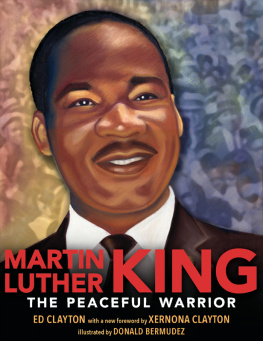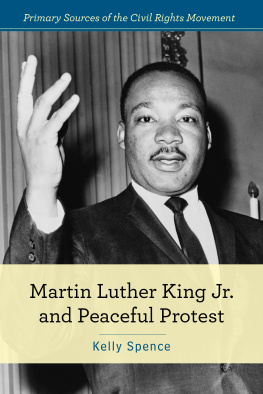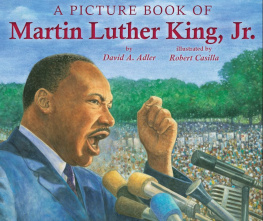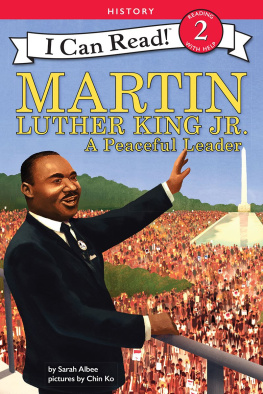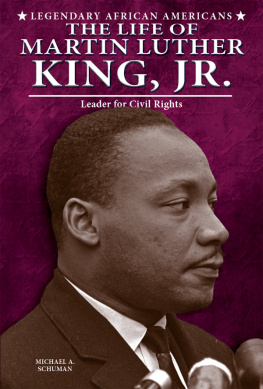
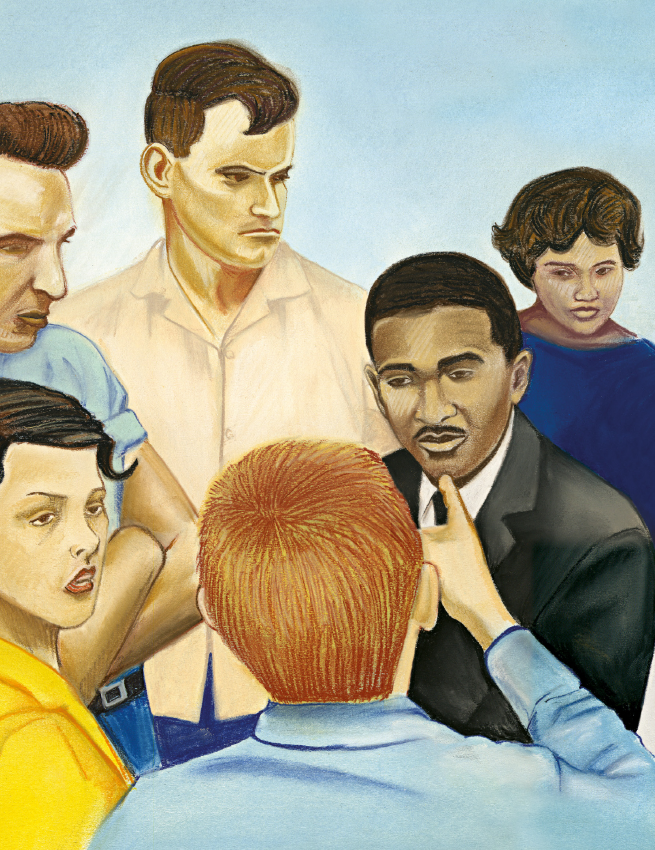

MY HUSBAND, Ed Clayton, had been employed for over twenty years as an editor for Ebony and Jet magazines when he received a telephone call from Dr. Martin Luther King Jr.
Dr. King told Ed that the Southern Christian Leadership Conference (SCLC) had a great need to hire someone to assist in the area of public relations, speech writing, press releases, and organizing press conferences. He wanted to interest Ed in joining the civil-rights organization and sharing his skills.
Ed had established himself as a prolific writer early in his career. He cut his journalistic teeth in Louisville, Kentucky, his hometown, where he worked as a reporter for the citys leading daily newspaper, the Courier-Journal. He started out writing obituaries, which taught him how to make a story newsworthy. He learned to report deaths and lives by using fresh words and distinctive descriptions.
Ed was later promoted to sports reporter, then moved on to work for Johnson Publishing, the renowned publisher of black magazines such as Negro Digest, Ebony, Jet, and Tan. As he moved up the journalistic career ladder, eventually settling in Los Angeles, Ed gained increased respect for his thoroughness, freshness, and accuracy. He was a reporter who knew a good story when he heard one.
After a lengthy telephone discussion, Dr. King revealed that despite the SCLCs respect for Eds talent, the organization was unable to match those skills with comparable compensation. Ed thanked Dr. King for his compliments but said that he could not afford to give up a lucrative job for little pay. Nevertheless, Ed was persuaded to go to Atlanta to discuss the SCLCs offer.
Ed traveled to Atlanta for a two-month trial period, during which he saw the vast need for his skills. He was so impressed with Dr. Kings sincerity and the dedication and commitment of the staff that he reconsidered and decided to stay another two months before returning to his work in Los Angeles.
During that time, Ed met with Dr. Kings wife, Coretta Scott King, who expressed a desire to do a benefit concert to raise funds for her husbands organization. She was a talented concert singer, having graduated from the New England Conservatory. Ed agreed to help her launch the project, and he put forth a lot of energy planning and mapping her tour. He thought I might be interested in adding my own organizational skills to the project.
Ed was right. I talked with Mrs. King on the telephone from our Los Angeles home, and we spent countless hours discussing how I could be helpful to her. We launched the tour and, thanks to the support of several ministers who were already associated with the work of the SCLC, raised an impressive amount of money to further the great work led by her husband. She and I enjoyed the success and cemented a long friendship that lasted until the day she died. Our living friendship ended then, but my respect for what she did and the impact she made with her life remains today.
Eds value at the SCLC increased rapidly with the contributions he was making: organizing press conferences, preparing and releasing press statements, organizing photo files and setting up appropriate photo shoots, producing information pamphlets, writing speeches, and initiating many public relations print pieces.
As a result of monumental successes in such a short span of time, Dr. King and Mrs. King decided to ask both Ed and me to join their organization. They both expended time and energy to persuade us to move to Atlanta and continue the valuable service we had already rendered. After much soul-searching and deep thought, we agreed to the move.
My job was to travel with Mrs. King on her nationwide concert tours and also work in the office of the SCLC headquarters, acting in various capacities.
Over time, Ed realized that Dr. Kings work was vast, important, and valuable to the nation. He lamented the fact that not everyone was fully aware of this noted mans contributions to humanity and decided that a book on his life would do much to frame his good works for future generations. He especially felt that children should know more about Dr. King and his lifes work and asked Dr. Kings permission to do it.
Dr. King had been approached by several writers who had expressed interest in writing a book. He had politely refused all offers, but he said yes to Ed. Thus, The Peaceful Warrior was Eds valiant attempt to preserve the life and legacy of this great human being.
The book, written in 1965, is as relevant today as it was then. Dr. King, founder and president of the SCLC, is considered the foremost advocate of the civil rights movement. He was thirty-nine years old when he died, and we are still remembering his voice and his vision nearly fifty years after his death. His name appears on streets, government buildings, schools, highways, housing projects, hospitals, community centers, and other public places, causing us to remember.
Dr. King was a visionary whose deeds greatly influenced the structure, texture, and tone of the society in which we live. He made equal rights his lifes work, and although he was beaten and imprisoned, he never stopped teaching nonviolence and making love his centerpiece.
I am fortunate to remember him as a personal friend.
Xernona Clayton

SOMEDAY, whispered Martin Luther King Jr. to his mother as they sat together in church listening to a guest speaker, Im going to have me some big words like that.
Alberta King looked at her eleven-year-old son with quiet gentleness and pride. Im sure you will, son, she whispered back. And to herself she thought, It will be a lot easier for him to come by his bigwords than it was for his father before him.
She knew that if young Martin were called to the work, he would very likely follow his father as pastor of Ebenezer Baptist Church. But, her husband, Martin Senior, had not had a ready-made berth to step into. He had fought for his place in the world, with sweat and raw determination.
Mrs. King mused on, only half hearing the rich voices of the choir. Her own father, the Reverend Adam Daniel Williams, had served as the pastor of Ebenezer Baptist Church for thirty-seven years. He had practically built it up from the ground. Martin Senior had taken over as pastor when his father-in-law had died, but he had had to take many giant steps first. Martin Senior was a sharecroppers son. He was born on a run-down farm in Stockbridge, Georgia, at the turn of the century on December 19, 1899. Long before he had ever seen the inside of a schoolhouse, he was at work in the fields with his ten brothers and sisters, helping to plant and harvest their meager crops of cotton and corn. Until he was fifteen, he never had more than three months of schooling in any one year.
Even on school days Martin Senior had had his chores. He was up at dawn to curry, or brush down, the familys two mules. His schoolmates often teased him because they said he even smelled like a mule!

